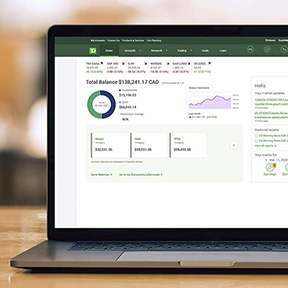X

ETFs vs. index funds: Understanding the differences
Before the advent of digital music, building your own soundtrack was an arduous and time-consuming process. You could lose hours trying to find and record the right mix of songs for your cassette or compact disc. Just as your favourite streaming service made it easier to download a premade playlist, index funds and exchange-traded funds can make it easy for investors to build a diversified portfolio on their own without having to search for individual investments.
Index funds and Exchange Traded Funds (ETFs) are investments that allow you to buy a basket of companies, typically based on an index. But rather than try to beat the market, these investments are typically designed to match it. It can be a rewarding approach for many investors. Why? Here’s how index funds and ETFs can help tune up your portfolio.
What are index funds?
An index fund is an investment that holds a collection of stocks or bonds that mimic the composition of a benchmark, such as the S&P/TSX Composite Index or the S&P 500. When you invest in one of these funds, the cash is used to buy stock in all the companies within that index. These funds don’t try to outperform the market, they only try to match its returns. While the value of the underlying benchmark will fluctuate during the day, index funds are priced at the end of a trading day.
What are ETFs?
An ETF, or an exchange-traded fund, can be similar to an index fund in that it also bundles up several different investments. Like index funds, ETFs may also seek to mirror the performance of a benchmark index, although there are a growing number of actively managed ETFs as well. However, unlike index funds, ETFs can be bought and sold on the open market at any point in the day, similar to a stock.
What are the similarities between index funds and ETFs?
Diversification
Diversification, one of the basic tenets of portfolio construction, can help reduce volatility for an overall portfolio, but researching and trading every investment in your portfolio can be time-consuming and challenging. It can also be difficult to achieve if you don’t have much money to spread across several different investments. ETFs and index funds both can help you overcome that challenge. Since they can hold the stocks or bonds of hundreds of companies in a single investment, one ETF or index fund can instantly give you broad sector or market diversification.
Lower fees compared to mutual funds
Since most ETFs and index funds track a benchmark, there are often no professional managers picking the securities that go into the fund, as there are with actively managed mutual funds. That means you don’t have to pay for fundamental research, the expenses of managing the fund or any buying and selling that may happen within the fund.
Steady, long-term performance
Passively managed funds that track the market have historically performed well in comparison with actively managed funds. Although some fund managers may outperform their benchmarks over a specified term, it can be challenging to sustain a market-beating strategy over the long haul. A mutual fund’s higher fees can also erode returns over time.
What are the differences between index funds and ETFs?
Trading frequency
While ETFs can be traded on the open market, with prices fluctuating throughout the day, index funds set their prices only once a day at market close. This means the price you pay for shares of an ETF may be more closely aligned with the market it mirrors than those of an index fund. It can give investors more control over the price they pay for an asset.
Fees
ETFs and index funds both have relatively low fees. Both charge a management expense ratio, an annual fee that covers the cost of operating the fund. Generally, these fees, which are charged as a percent of your holdings in the fund, are typically low compared to mutual funds.
Although the fees on ETFs can be lower than the fees on index funds, some discount brokerages may charge a fee each time you buy and sell an ETF. That may be worth noting as trading commissions can eat into your returns and drive up your costs – especially when making smaller investments. Index funds, by comparison, don’t charge a trading commission, although they may have minimum investment requirements.
Taxes
ETFs and index funds can both be tax efficient – in part because there’s generally low turnover in these funds – but ETFs may have a slight edge because of the way they are structured. When you sell an ETF, the transaction happens on the open market and the purchase is usually made directly by another investor. As a result, any capital gains tax is typically applicable only to the investor selling the ETF.
Fractional shares
Fractional shares allow you to buy a portion of a share instead of paying for the whole thing. Some brokerages now allow you to make fractional purchases, including ETFs, which makes it easier to make smaller purchases; just be aware of any trading costs you may incur. You can invest whatever amount you like with an index fund, although many index funds have minimum investment requirements.
Minimum investment threshold
ETFs are generally seen as having a lower entry price than index funds since the minimum investment is typically the cost of a single unit. Still, if you only have a small amount of money to invest, trading fees may noticeably increase your costs.
Index funds often have a minimum investment requirement. For example, if you’re making your first investment in an index fund, it can be common for it to have an initial minimum investment. Some funds may also require you to make a minimum subsequent investment

Pros and Cons : ETFs & index funds
ETFs
Pros:
- ETFs may be for people just starting out who might not have the resources to build a diversified portfolio.
- While some of the more popular ETFs follow the major indexes like the NASDAQ 100, there are many products available that can help you gain exposure to just about any sector, market or investment style that suits your investment goals.
- ETFs can be cost-effective. Passive ETFs are known to charge extremely low Management Expense Ratio (MERs) and may be lower cost than similar index funds.
- Because ETFs are bought and sold on public markets, sophisticated investors have flexibility when making trades, such as making purchases on margin.
- ETFs seek to be priced at fair value and allow for intraday trading.
Cons:
- ETF trading costs may include commissions and other trading fees, which could potentially reduce the net return to an investor.
- Depending on your brokerage, you may or may not have the ability to purchase fractional shares, a common feature among index funds. The ability to purchase fractional shares can enable investors to set-up automatic deposits based on a dollar amount, making it easier to invest regularly over the long term.
Index funds:
Pros:
- Index funds are another low-cost way for investors to manage risk and build a diversified portfolio.
- Similar to ETFs, these passive investments include lower MERs than those overseen by active managers.
- Because they track major indexes, they offer an easy way to add broad market or sector diversification to your portfolio quickly.
Cons:
- Index funds seek to track their respective benchmark, and not outperform the market. For investors seeking to outperform the market, index funds may not be the right product.
- Without a manager actively overseeing the fund, investors have few options for limiting losses during periods of volatility.
- As with passive ETFs, diversification may limit the upside of these funds.
FAQs related to ETFs & index fund comparison
What are the disadvantages of owning an ETF over an index fund?
ETFs may have lower expense ratios than index funds, but some brokerages may charge you a transaction fee when you make a purchase or sale. These fees may limit your potential returns over time.
Why choose an index fund over ETF?
The ease in which investors can automate their regular contributions to an index fund may make this product an appealing option for some. In addition to helping instill the discipline required to grow a healthy portfolio, automatic contributions allow investors to maximize the benefits of other investing strategies, such as dollar cost averaging.
What are the cons of investing in index funds?
Because index funds passively mirror a particular index, they may not be as flexible as those overseen by active managers. This may not be an issue when markets are going up, but when they take a dip, you can expect to see a drop in the value of your investment.
Do you pay taxes on ETFs if you don’t sell?
ETFs have a unique structure that may come in handy for investors at tax time. Unlike index funds, in which a fund manager may have to liquidate part of the portfolio to fund redemptions, a redemption from an ETF might not result in an outright trade. This means that there may be fewer instances of receiving a capital gains distribution at year-end. However, to the extent capital gains distributions are made, they will be immediately taxable.
Are ETFs safer than index funds?
Both vehicles come with a certain amount of risk. The level of risk depends on the index that the investment is seeking to track and how any fees associated with them are structured.
The bottom line
ETFs and index funds are two ways for new and seasoned investors to gain broad, long-term market exposure. They may not offer the tempting appeal of trying to beat the markets, but they can provide a way to build a diversified portfolio that can help you manage the effects of market volatility without spending all your time and energy on research. Although the two types of funds can carry different fee structures and tax implications, both can be a simple and cost-effective way to build for your future. As always be sure to do your research before finding the right fund.
Share this article
Related articles
View our learning centre to see how we're ready to help.
Open an account online – it's fast and easy!
Whether you're new to self-directed investing or an experienced trader, we welcome you.
Get Started with TD Direct Investing

